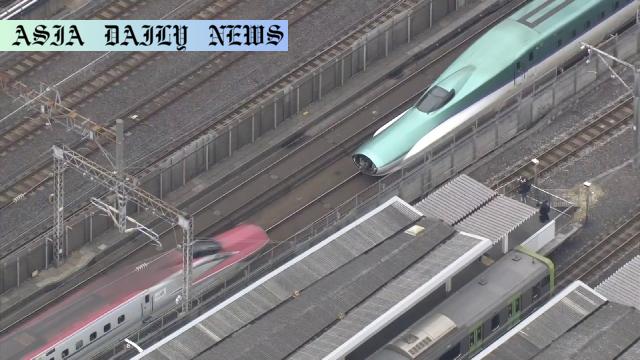Shinkansen operations will return to normal schedules starting Saturday after temporary suspensions.

Introduction to the Incident
East Japan Railway (JR East) faced an unprecedented challenge last Thursday when an incident involving coupled Shinkansen trains caused a temporary suspension of services. This occurred when the Hayabusa and Komachi trains on the Tohoku Shinkansen line decoupled while in operation. The safety and reliability of the Shinkansen, a cornerstone of Japan’s railway infrastructure, were put into question, prompting immediate action from JR East.
Steps Towards Restoration
In a bid to restore normalcy, JR East announced that coupled Shinkansen operations would gradually resume from Friday. By Saturday, the trains are expected to run on regular schedules, with newly implemented safety measures. To ensure passenger safety, the railway operator addressed the root of the issue by reinforcing the connecting parts of the trains with metal fittings. This modification will significantly mitigate the risk of decoupling, even in the event of an electrical abnormality.
Significance of the Shinkansen
The Shinkansen, known for its speed and precision, represents Japan’s commitment to excellence in transportation. Incidents like this disrupt not only the operations but also public trust and confidence in this iconic system. JR East’s swift and decisive action demonstrates their dedication to upholding safety standards while minimizing service disruptions.
Looking Forward
Although the decoupling incident caused temporary inconvenience, it also spurred a reevaluation of safety protocols and technical advancements. By addressing the issue with new metal fittings, JR East not only resolves the immediate problem but also fortifies the reliability of the Shinkansen system for future operations. As services resume, passengers can look forward to enhanced safety and a renewed commitment to excellence.
Conclusion
JR East’s approach to resolving the Shinkansen decoupling incident highlights a commitment to safety and service reliability. With gradual resumption of coupled train operations set to commence on Friday, the company has demonstrated both transparency and efficiency in addressing the issues. Passengers and stakeholders alike can take confidence in the reinforced infrastructure and proactive measures JR East has adopted.
Commentary
The Shinkansen’s Legacy of Reliability
Japan’s Shinkansen, often referred to as the “bullet train,” has long symbolized the zenith of punctuality, speed, and safety in mass transit. The recent decoupling incident involving JR East’s coupled Shinkansen trains marks a rare blemish on this otherwise spotless record. Yet, rather than dwelling on the setback, it is vital to view this situation as an opportunity for growth and improvement.
Addressing Challenges with Precision
JR East’s response to the decoupling situation exemplifies the emphasis placed on passenger safety and trust. The quick identification of the issue and the introduction of reinforced metal fittings to the coupling mechanisms demonstrate a proactive approach. This not only resolves the immediate problem but simultaneously reassures passengers that the trains they rely on are operating at the highest safety standards.
Reinforcing Public Trust
In the realm of public transportation, trust is paramount. Incidents like this could have shaken confidence in the Shinkansen system; however, JR East’s transparency and swift action help mitigate that risk. By addressing the core issue and resuming operations within a week, the company reinforces its dedication to providing safe, reliable, and world-class transportation services.
A Step Toward the Future
Ultimately, the lessons learned from this incident will strengthen JR East and Japan’s larger rail infrastructure. With safety as a keystone, the measures introduced today will serve as a foundation for even greater technological innovation. While this incident may have been an unforeseen challenge, JR East has turned it into an opportunity to bolster an already iconic system. The Shinkansen’s future looks as promising as ever.


